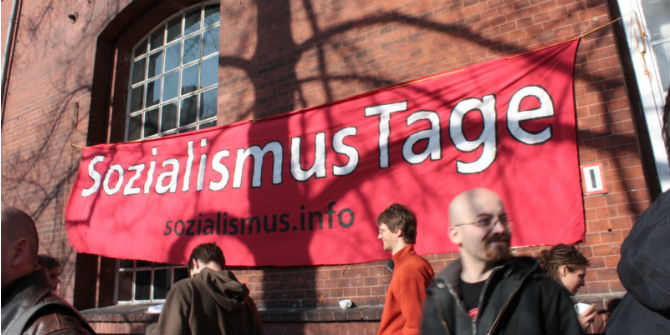 German liberal ideology has come to dominate the European Union, but it is fraying as movements for popular sovereignty gather pace. Brexit is the tip of the iceberg, writes Michael Wilkinson (LSE). It represents a chance for the Left to reconnect with democratic socialism and reject an authoritarian Europe in favour of progressive politics.
German liberal ideology has come to dominate the European Union, but it is fraying as movements for popular sovereignty gather pace. Brexit is the tip of the iceberg, writes Michael Wilkinson (LSE). It represents a chance for the Left to reconnect with democratic socialism and reject an authoritarian Europe in favour of progressive politics.
A spectre is haunting Europe – the spectre of popular sovereignty. All the powers of old and new Europe have entered into an unholy alliance in order to banish this spectre: Pope and President, Tusk and Juncker, French socialists and German ordoliberals.
Where is the movement that has not been decried as populist by the powers that be? Where is the opposition that has not hurled back the reproach of democracy against its adversaries?
In the current moment this situation is largely exploited by the Right, from within the European Union. It is high time for the caricature of popular sovereignty to be met with a Lexit manifesto, a Left-wing project of democratic socialism and internationalism that does not shy from exiting the EU if necessary.

As a prelude to this task, it is imperative to ask why there is so much resistance to a democratic project of popular sovereignty in general and exit from the European Union in particular. The answer is that nothing less is at stake than the dominant postwar ideology – the new German ideology. This must first be decoded in order to be transcended.
The new German ideology emerges from the mislabeled concept of ‘militant democracy’, mislabeled because it means the opposite of what it suggests; it means that democracy must be limited, tamed, and moderated, forcefully if necessary. It is more appositely named liberal or ‘constrained democracy’, which gestures towards a democracy that distrusts itself. But even this elides its purpose, which is less to consolidate democracy than to restore and maintain a liberal economic order.
The new German ideology is in an important sense reactionary, specifically to the threat of popular sovereignty, democracy and class consciousness unleashed in the interwar period, when universal suffrage begins to threaten the bourgeois state and state-system. Its constitutional character is appositely captured by the sentiment, ‘We are afraid of the people’; in its dominant ordoliberal version, this signals a fear that the people will make irrational decisions about the economic order or about the money supply.
The notion of popular sovereignty as the democratic power to constitute anew is lost, swallowed up into the authority of the constitution itself – ironically in the form of a basic law, protected by specialist constitutional interpreters and constitutional courts. Popular sovereignty is suppressed through the substitution of democratic constituent power with individual economic freedom — a freedom to participate in the market — as the legitimating device for the whole constitutional order.
This represents the ‘original sin’ of postwar Europe because it represents a narrow diagnosis and in significant part a misdiagnosis of interwar breakdown, underlining democratic decay and occluding the central role played by the crisis of capitalism. With the implication that the decline of Weimar accelerates through an excess rather than a privation of democracy, it leads to a great forgetting; liberals and conservatives united to maintain an authoritarian regime in the early 1930s in an attempt to maintain the liberal economic order and forestall any move towards democratic socialism.
The new German ideology is built on related myths, such as hyperinflation leading directly to democratic collapse. It has a profound cultural dimension; fear of democracy infects the social imagination: it is not only that elites are afraid of the people, the people are afraid of themselves. The result is an escape from political freedom. It is institutionalised and zealously guarded in the domestic and international corridors of Commissions and Constitutional Courts, Central Banks and Committees, upscaled through regional and international institutions.
Postwar Europe is characterised by this new form of authoritarianism, more subtle than the authoritarian rule of charismatic leaders but no less de-politicising in form. Frequently conceptualised as part of a later neoliberal transition to a ‘post-political’ or ‘post-democratic’ world, dominated by a managerial and technocratic politics of consensus, it is more properly characterised as ‘authoritarian liberalism’, with politically authoritarian means employed to achieve economically liberal, if now often labelled neoliberal ends. Although this is exacerbated through the period of neoliberalism as the social contract between labour and capital is breached, and it accelerates through the recent Euro-crisis phase as the social contract is ripped up, authoritarian liberalism underwrites the dynamic right from the start of postwar reconstruction.
European integration reflects the new German ideology writ large, locking in liberal economic constraints through its constitutionalisation of the single market, protecting undistorted competition and free movement of the factors of production. This has an acute deregulatory impact over time; through its own legal and constitutional dynamic it severely undermines social democratic commitments at the national level and fails to upscale them to the supranational level. After Maastricht, which lays the ground for Economic and Monetary Union, European integration becomes more and more material to the suppression of political democratic alternatives. With its authoritarian character heightened through the recent decade-long Euro-crisis, it culminates in a political philosophy of ‘no alternatives’. Elections fail to offer any possibility of meaningful change. If democracy begins in constraint, it ends in capitulation – to the markets, or to the European Treaties.
The new German ideology comes to dominate the whole European constitutional imagination, even in places where the story of democratic decay resonates less or not at all. But where constraints are threatened by popular sovereignty from the Left, however democratically motivated and rationally justified, the punishment is severe, and the consequences devastating. Where liberal democratic commitments are threatened from the Right, however authoritarian their form, Europe is impotent, unable to respond or lacking the legitimate authority to do so.
An extraordinary feature of this settlement is that it has locked the Left in to the EU project, from social democrats to Euro-communists. Refusing serious opposition, it is caught between accepting that however neoliberal in character, the default to European integration is ethnic nationalism, or buying into a scalarist eschatology which promises a pan-European socialist utopia if only patience is maintained. Paralysed between lesser evilism and the luxury of intellectual optimism, the concrete political struggles for democratic socialism are avoided.
The new German ideology is fraying. By the time of German reunification and the Maastricht Treaty, it became contested and unstable in its own backyard, with sovereignty claims resurfacing after a hiatus of 50 years and nationalisms rising. This presented a series of irritants to the postwar constitutional order, which over the last decade, emerge into a full-blown crisis. Sovereignty claims multiply and intensify, no longer constrained, but distorted in their disconnect from any democratic base. Matching the centrifugal force of assertions of sovereignty from below is the centripetal force of a ‘sovereignty-to-come’ from above; not one rooted in democracy or social movements, but imposed by a European Central Bank, a putative European Army, spearheaded by a shiny new brand of executive authoritarian liberals.
The new German ideology is struggling to maintain its grip over the imagination; its integrative function is broken and the extreme centre struggles to hold. It no longer has the capacity to close the gap between the European order’s claim to legitimacy and its subjects’ belief in it. It is generating the very symptoms it was meant to suppress, as Right-wing political extremism resurfaces, international solidarity is foreclosed and inter-state domination returns, substituting the German ideology for German hegemony. Europe has never been more disunited in the past 50 years than it is now.
Authoritarian liberalism has incubated the conditions for forms of authoritarian illiberalism, having hollowed out democracy in the drive to create the conditions for markets and capital to expand. If the leading proponents of European constitutionalism imagined their ideas would rule the world, in reality they ruled only a void. There should be no surprise when this void is then filled with the rhetoric of national identity and anti-immigration, a predictable counter-movement after a period of enforced liberal constitutionalisation, marketisation and rigid adherence to austerity. The case of Hungary illustrates the ‘counter-movement in one character’, Orban’s liberal pro-Europeanism in the context of accelerated transition to a market economy shifting into an illiberal reactionary nationalism, within a ‘Christian Europe’.
Where is the Left at this critical juncture? Frequently propping up an establishment in decline; a system in crisis, an order in disarray. Even where it has not been entirely eviscerated, ‘Pasokified’ after its turn to the centre ground, it is largely devoid of ideas, clinging to the German ideology because of its own fear of alternatives. Imagining that the only alternative to a neoliberal EU is right-wing nationalism, it misses that far from alternatives, this is precisely the combination emerging in and through the EU!
The Left must connect with the dynamic energies created by movements of popular sovereignty, radical democracy, and class politics. It must recognise that constrained democracy is historically redundant or conceptually oxymoronic; democracy means the continual and restless striving for collective self-determination. It must recognise not only that the European Union is no friend of democracy, socialism or internationalism, or of labour against capital, but that it is not even serving the purpose of keeping the Right at bay. On the contrary, the Right, having little need of rupture from the European Union to pursue its nationalist political agenda – whether in Hungary or Poland, or Italy – remains inside the state of the Union, largely unperturbed by its bureaucratic apparatus and yet reaping the electoral rewards of Euroscepticism, capitalising on the discontent with neoliberalism. This scenario could well be repeated in the United Kingdom should there be a reversal of the Brexit referendum result.
Britain’s departure from the EU provides an opportunity for the Left across Europe to reconnect with a democratic socialist project and the material struggle for equality. That democratic struggle was interrupted by the postwar resettlement, constrained in a so-called ‘golden age’ when authoritarianism was masked by economic growth, decimated by decades of neoliberalism, and finally dealt a near-fatal blow through the Euro-crisis period. The rupture of Brexit offers a broader occasion to break with this trajectory, to advance a project that combines popular sovereignty with social radicalism, unambiguously internationalist and anti-capitalist in nature.
If it is through Lexit that popular sovereignty might reconnect with democratic socialism, this will be not just in the UK, but across the whole of Europe. Brexit is the visible tip of an iceberg, representing the deeper and wider disconnect between the political class and the citizen across the European Union. But it is within and over the state that concrete political struggles can still most credibly be fought, in connection with political parties and social movements.
It may seem ironic that the Lexit project begins in the country with an advanced neoliberal trajectory, a near decade of self-imposed austerity and without the more radical constraints of Eurozone membership. But just as significantly, it is a country in which the German ideology is least hegemonic, less constitutionally and culturally entrenched, the obstacles to depart from the EU less insurmountable and the potential for developing a genuine internationalist agenda most apparent.
With Jeremy Corbyn’s Labour, the UK now has the biggest democratic socialist party in Europe with the potential to push forward a realistic but radical leftwing economic programme. Brexit presents an opportunity for the UK to free itself from market rule; to develop an alternative plan to fix a broken economic model and offer a new social settlement. Strategies of economic renewal must be replicated elsewhere in Europe, reclaiming sovereignty as a vehicle for progressive change. That the rupture from the postwar settlement occurs with Brexit may be a strange twist of fate; whether its destiny is realised will matter not only for Britain but for Europe as a whole.
This post represents the views of the author and not those of the Brexit blog, nor the LSE.
Michael Wilkinson is Associate Professor of Law at the LSE.







I had to read this article twice to reassure myself that it wasn’t written with the authors tongue firmly in his cheek.
The mess that Europe (including the UK) finds itself in is completely down to the so called Liberal and Socialist policies adopted by previous (and current) politicians and their supporters. Therefore is it any wonder that voters across Europe have had enough and are voting for people who listen to them and introduce policies that address their concerns.
As for Corbyn and his supposed democratic socialism, don’t make me laugh. We have had years of Tory Government and austerity and Corbyns personal approval ratings are a joke, they are barely above Mays when at this point an effective opposition leader should be enjoying an enormous lead.
Agree. Moreover, implementing this Lexit vision would take years and therefore several consecutive Labour governments. Just don’t see this.
In a more lengthy way than I could subscribe this explains my thoughts entirely.
People require freedom for their country in a way that enables trade ,life style wishes and peace for all.
Need I say more?
I have no wish to denigrate other people.
.Let us have free counties,trading together and have peace.
Do we need more?